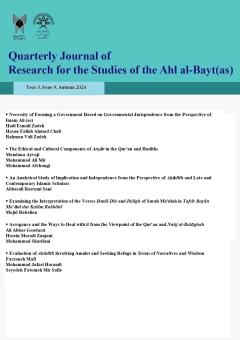Necessity of Forming a Government Based on Governmental Jurisprudence from the Perspective of Imam Ali (as)
Subject Areas : Quarterly Journal of Research for the Studies of the Ahl al-BaytHadi Esmail Zadeh 1 , Hasan Fallah Ahmad Chali 2 , Rahman Vali Zadeh 3
1 - PhD student in Jurisprudence and Fundamentals of Islamic Law, Faculty of Theology and Islamic Studies, Babol Branch, Islamic Azad University, Babol, Iran.
2 - Assistant Professor of Islamic Religions and Mysticism, Faculty of Theology and Islamic Studies, Babol Branch, Islamic Azad University, Babol, Iran (Corresponding author).
3 - Assistant Professor of Islamic Jurisprudence and Law, Faculty of Theology and Islamic Studies, Babol Branch, Islamic Azad University, Babol, Iran.
Keywords: Necessity, Government, Governmental Jurisprudence, Imam Ali (as).,
Abstract :
Shia jurisprudence, as a valuable heritage from the previous jurisprudents, has always been codified on the basis of fundamentals, which responded to the individual and social needs of societies, in such a way that in addition to responding to Sharia issues in the individual sphere, in the macro and governmental context as well. In the direction of the desired management of the society towards worldly and Hereafter happiness and finally the formation of Islamic civilization, the introduction of which is government jurisprudence, has been taken into consideration. In the definition of government jurisprudence, despite the many definitions, it is jurisprudence that is the basis of the formation of the government and government institutions, as well as the basis of government decisions and determines the form, content and orientation of government regulations and laws. The subject under discussion is the necessity of forming a government based on the principles of governmental jurisprudence from the point of view of the words of Imam Ali (as). The issue of forming a government is one of the supreme goals of creation and causes the growth and perfection of human beings, and it has always been the focus of divine prophets and pure imams.
منابع
1- قرآن کریم
2- نهج¬البلاغه
3- اخوان کاظمی، بهرام،«آرمان های حکومت از دیدگاه امام علی»،مجله کوثر، ص 342، شماره
4- اراکی، محسن، (1393). فقه نظام سیاسی اسلام، جلد 4، قم: انتشارات معارف 36
5- ابن فارس،احمد بن فارس بن زکریا.(1387ق) معجم مقاییس اللغه.چاپ اول. قم:مرکز دراسات الحوزه والجامعه.
6- ابن منظور، محمد بن مکرم، (1385)، لسان العرب، 20 جلد، اول، انتشارات احیاء التراث العربی، بیروت
7- پرور، اسماعیل، (1390)، «فقه حکومتی چرایی، چیستی و چگونگی»، سوره اندیشه، دوره شماره 56 و 57، 195-192
8- حافظ نیا، محمد رضا؛ (1397). مقدمه¬ای بر روش تحقیق در علوم انسانی، چاپ دهم، تهران، انتشارات سمت
9- - ﺧﺎﻣﻨﻪاي،سید علی، بیانات در دیدار با جمعی از علما و روحانیون و طلاب،6/1/1366
https://farsnews.ir/news (access 31-7-2024)
10-- دلشاد تهرانی،مصطفی(1377). دولت آفتاب،تهران: خانه اندیشه جوان.
11- دلشاد تهرانی، مصطفی(1390). جزوه حکومت و مدیریت در نهج البلاغه، شهر ری:دانشکده علوم حدیث.
12 - دهخدا، علی اکبر.(1325). لغت¬نامه جلد چهارم. چاپ اول.. تهران: سازمان لغت¬نامه دهخدا.
13- ذوالفقاری، محمد، سیدیان، سید مهدی، (1391)، «فقه حکومتی؛ چیستی، چرایی، چگونگی»، معرفت سیاسی، دوره چهارم، شماره 1، 67-49
14- سلمانی کیاسری، محمد(1385).حکومت و رهبری از منظر نهج البلاغه، قم:انتشارات مسجد مقدس جمکران.
15- شب¬خیز، محمدرضا، (1392) اصول فقه دانشگاهی، چاپ دوم، انتشارات کتاب آوا، تهران
16- ضیایی¬فر، سعید، (1391)، رویکرد حکومتی به فقه، علوم سیاسی، دوره 14، شماره 53، 31-7
17- فراهیدی، خلیل بن احمد، (1364)، العین، 8 جلد، چاپ اول، انتشارات اسوه، تهران
18- مشکانی سبزواری، عباسعلی، (1390)،درآمدی بر فقه حکومتی از دیدگاه مقام معظم رهبری»حکومت اسلامی، دوره 16، شماره 2، 184-155
19- مجلسی،محمد باقر.(1403ق) بحار الانوار .جلد صد و چهارم .بیروت:دارا الحیاء التراث العربی.
20- مطهری، مرتضی، (1377)، آشنایی با علوم اسلامی، چاپ اول، انتشارات صدرا، تهران.
21- میرباقری، سید محمد مهدی، عبدالهی، یحیی، نوروزی، حسن، ، (1395) «فقه حکومتی از منظر شهید صدر»، راهبرد فرهنگ، شماره 36، 86-61


